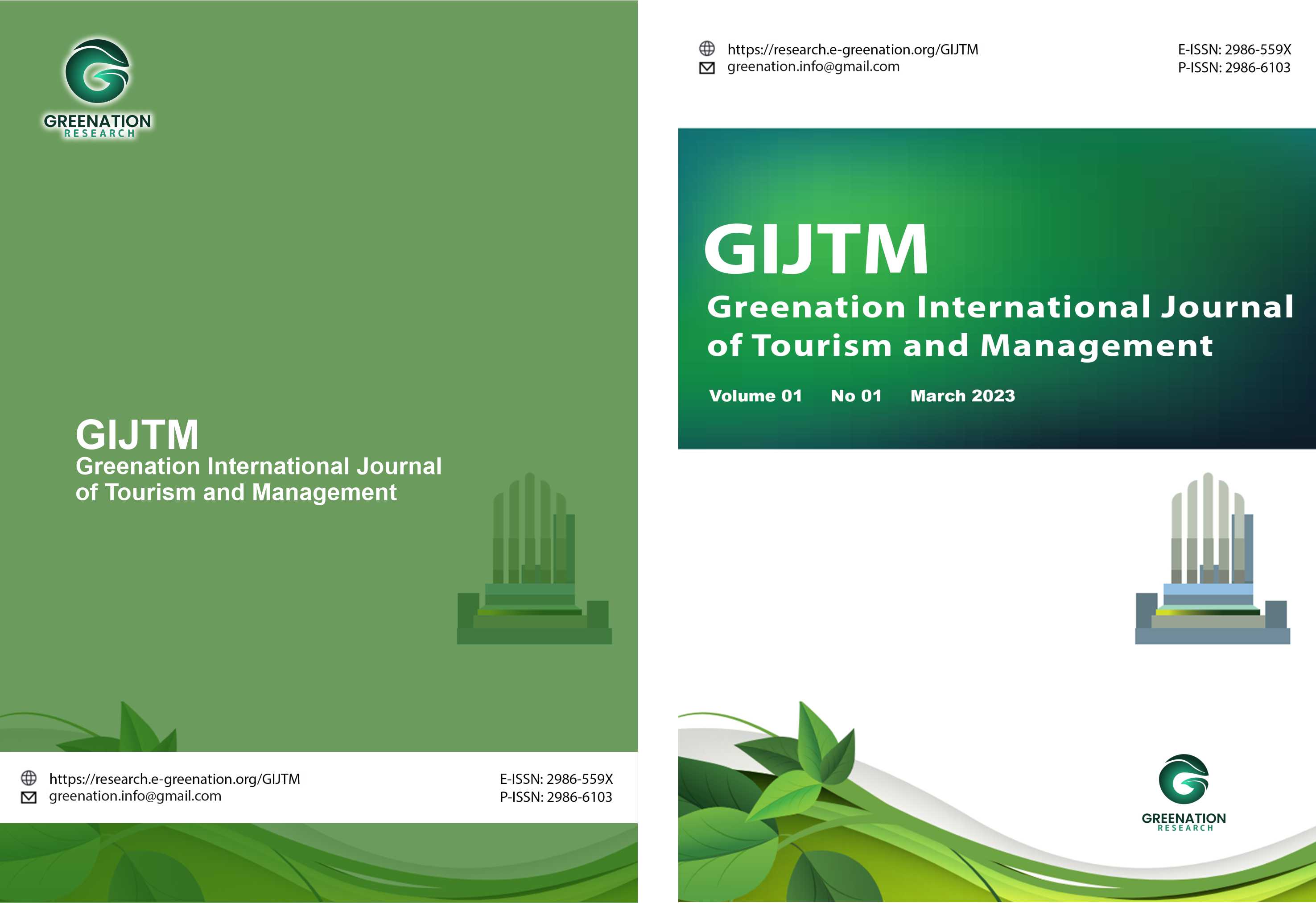Linking Cruise Ship Arrivals to MSMEs Empowerment: A Case Study of Benoa Port, Bali
DOI:
https://doi.org/10.38035/gijtm.v3i3.514Keywords:
Benoa Port Bali, Cruise tourism, MSMEs empowerment, SET-Based EvaluationAbstract
This study examines the linkages between cruise ship arrivals and the empowerment of MSMEs at Benoa Port, Bali. The research is grounded in the phenomenon of MSMEs' dependency on the episodic flows of cruise tourists, which simultaneously create opportunities and vulnerabilities. The objective of the present study is threefold: first, to analyze MSMEs responses to cruise tourism; second, to assess social, economic, and environmental dimensions through the SET-Based Evaluation framework; and third, to identify emerging adaptive strategies. A qualitative case study approach was employed, combining in-depth interviews, participant observation, and secondary data analysis. The findings indicate that MSMEs derive substantial economic benefits by adopting positive adaptation strategies such as pricing adjustments, product diversification, extended operating hours, and digital payment adoption. However, a small group of MSMEs exhibited neutral or resistant attitudes, indicative of heterogeneity in adaptive responses. The study's findings indicate that cruise tourism offers considerable potential for the empowerment of MSMEs. To promote long-term sustainability, the study recommends policy interventions aimed at enhancing resilience, expanding market access, and ensuring inclusive and environmentally responsible development.
References
Adharani, Y., Astriani, N., & Afifah, S. S. (2020). Benoa Bay Reclamation?: the Impact of Policy-Making for. Humanities & Social Sciences Reviews, 8(4), 1227–1239.
APEC. (2020). APEC Economic Study on the Impact of Cruise Tourism: Fostering MSME’s Growth and Creating Sustainable Communities. AEC Group Pty Ltd.
Armanu, A., Indrawati, A. D., & Korry, P. D. P. (2023). The Role of Micro, Small and Medium Enterprises for Bali’s Economy (Contribution of Innovation to MSME Sustainability). In Thriving in a Disruptive World: How Entrepreneurs and Managers Learn for a Brighter Future (Issue July). https://doi.org/10.11594/futscipress46
Božovi, T. (2025). Cruise Tourism and the Socio-Economic Challenges of Sustainable Development?: The Case of Kotor , Montenegro. Sustainability, 1–16.
Brida, J. G., & Zapata, S. (2010). Cruise tourism: economic, socio-cultural and environmental impacts. International Journal of Leisure and Tourism Marketing, 1(3), 205. https://doi.org/10.1504/ijltm.2010.029585
Cheer, J. M. (2017). Cruise tourism in a remote small island - high yield and low impact? Cruise Ship Tourism, April 2016, 408–423. https://doi.org/10.1079/9781780646084.0408
Cole, S. (2012). A political ecology of water equity and tourism. A Case Study From Bali. Annals of Tourism Research, 39(2), 1221–1241. https://doi.org/10.1016/j.annals.2012.01.003
Cropanzano, R., & Mitchell, M. S. (2005). Social exchange theory: An Interdisciplinary review. Journal of Management, 31(6), 874–900. https://doi.org/10.1177/0149206305279602
Delamater, J. (2006). Chapter 18, Handbook of Social Psychology. Handbook of Social Psychology, June, 571. https://doi.org/10.1007/978-94-007-6772-0
Dinariyana, A. A. B., Handani, D. W., Adhita, I. G. M. S., Prastyasari, F. I., & Wirawan, K. P. P. (2025). Cruise terminal operational evaluation from an environmental, social, and governance perspective using a system dynamics approach. International Journal of Innovative Research and Scientific Studies, 8(3), 2987–3004. https://doi.org/10.53894/ijirss.v8i3.7125
Hoarau-Heemstra, H., Wigger, K., Olsen, J., & James, L. (2023). Cruise tourism destinations: Practices, consequences and the road to sustainability. Journal of Destination Marketing and Management, 30(April), 100820. https://doi.org/10.1016/j.jdmm.2023.100820
Lin, L. Y., Tsai, C. C., & Lee, J. Y. (2022). A Study on the Trends of the Global Cruise Tourism Industry, Sustainable Development, and the Impacts of the COVID-19 Pandemic. Sustainability (Switzerland), 14(11). https://doi.org/10.3390/su14116890
Mariani, A. S., Rakhman, A., Widjojokusumo, E., Soetanto, G., & Leonardi, J. (2024). Exploring the Dynamic Capabilities Pattern in Small and Medium-sized Enterprises (MSMEs): A Phenomenological Study of MSME stagnancy in Indonesia. Jurnal Syntax Admiration, 5(7), 2431–2446. https://doi.org/10.46799/jsa.v5i7.1330
Paiano, A., Crovella, T., & Lagioia, G. (2020). Managing sustainable practices in cruise tourism: the assessment of carbon footprint and waste of water and beverage packaging. Tourism Management, 77(January 2019), 104016. https://doi.org/10.1016/j.tourman.2019.104016
Ruiz-Guerra, I., Molina-Moreno, V., Cortés-García, F. J., & Núñez-Cacho, P. (2019). Prediction of the impact on air quality of the cities receiving cruise tourism: the case of the Port of Barcelona. Heliyon, 5(3). https://doi.org/10.1016/j.heliyon.2019.e01280
Sadeli, Y. A. (2025). The Dynamics of Small Business Owners’ Experiences in Managing and Growing Their Enterprises: A Subjective Perspective in Indonesia’s MSME Sector. Journal of Business, Management, and Accounting, 1(3), 129–136.
Sandven, A. H., Jørgensen, M. T., & Wassler, P. (2024). Residents’ coping with cruise tourism. Annals of Tourism Research, 105, 103732. https://doi.org/10.1016/j.annals.2024.103732
Suci Ramadani, Dilla Amelia Ramadhani, Muhammad Ikrom, & Lokot Muda Harahap. (2025). Peran Strategis UMKM dalam Mendorong Pertumbuhan Ekonomi Berkelanjutan di Indonesia. Jurnal Ekonomi, Bisnis Dan Manajemen, 4(1), 158–166. https://doi.org/10.58192/ebismen.v4i1.3183
Syriopoulos, T., Tsatsaronis, M., & Gorila, M. (2020). The global cruise industry: Financial performance evaluation. Research in Transportation Business & Management, 45(January). https://doi.org/https://doi.org/10.1016/j.rtbm.2020.100558
Widiastini, N. M. A., Arsa, I. K. S., Syah, A. M., & Hajarrahmah, D. (2023). How Do Micro, Small, And Medium Enterprises (MSMEs) In Bali Survive The Pandemic? A Qualitative Study In Buleleng, Tabanan, Gianyar, And Denpasar. International Journal of Professional Business Review, 8(3), 1–24. https://doi.org/10.26668/businessreview/2023.v8i3.829
Downloads
Published
How to Cite
Issue
Section
License
Copyright (c) 2025 Anak Agung Putri Sri , I Ketut Antara, Fanny Maharani Suarka, Putu Ratih Pertiwi, Randhi Nanang Darmawan, Nyoman Galuh Narendraswari Saraswati

This work is licensed under a Creative Commons Attribution 4.0 International License.
Copyright :
Authors who publish their manuscripts in this journal agree to the following conditions:
- Copyright in each article belongs to the author.
- The author acknowledges that the Greenation International Journal of Tourism and Management (GIJTM) has the right to be the first to publish under a Creative Commons Attribution 4.0 International license (Attribution 4.0 International CC BY 4.0).
- Authors can submit articles separately, arrange the non-exclusive distribution of manuscripts that have been published in this journal to other versions (for example, sent to the author's institutional repository, publication in a book, etc.), by acknowledging that the manuscript has been published for the first time at GIJTM.

























